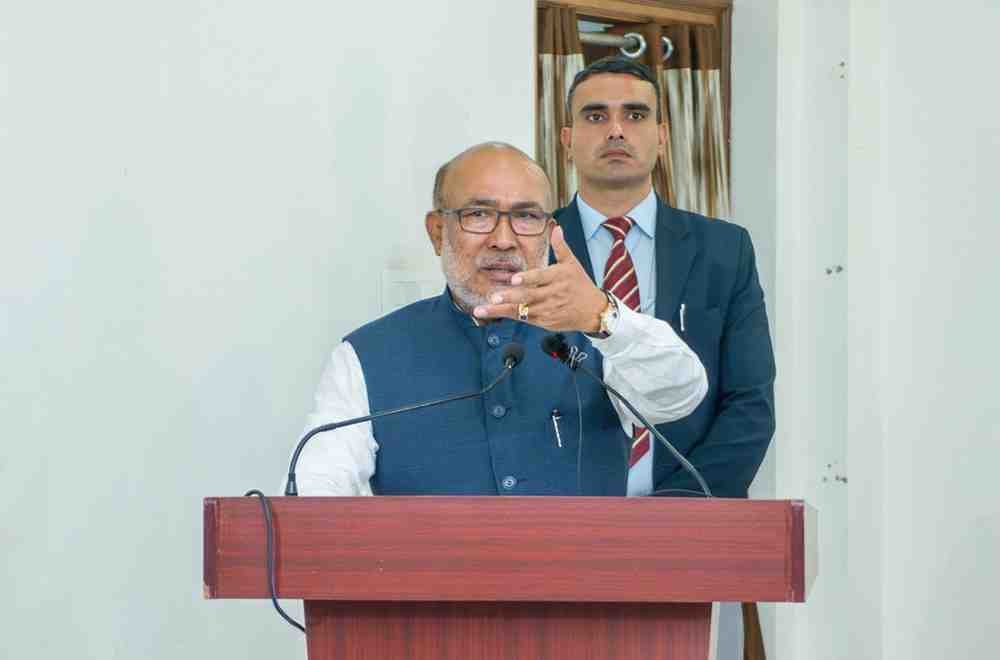Manipur has been placed under President’s Rule following the resignation of Chief Minister N Biren Singh, which occurred just a day before a scheduled no-confidence motion in the state Assembly.
The political landscape in Manipur remains uncertain, with no consensus on a successor for Singh, who stepped down amid escalating pressure from opposition parties and ongoing ethnic violence in the region.
The constitutional framework mandates that state Assemblies must convene within six months of their last session, as outlined in Article 174(1) of the Indian Constitution. The last Assembly session in Manipur took place on August 12, 2024, setting a deadline for the next sitting on Wednesday.
However, Governor Ajay Bhalla has called off the upcoming Budget session, which was slated to begin on Monday, following Singh’s resignation.
Singh’s departure from office comes nearly two years after ethnic violence erupted in Manipur in May 2023, leading to widespread unrest and a humanitarian crisis.
His resignation is seen as a strategic move to avoid a political showdown, as the state government was poised to face a no-confidence motion that could have further destabilized the already fragile political situation.
The Congress party has been vocal in its criticism of Singh’s resignation, alleging that it was a maneuver to protect the Bharatiya Janata Party (BJP) rather than addressing the needs of the people of Manipur.
Congress leader Priyanka Gandhi described the resignation as “long overdue,” while Gaurav Gogoi, the party’s deputy leader in the Lok Sabha, accused the BJP of lacking a clear plan to restore peace in the northeastern state.
The political turmoil intensified following a Supreme Court directive for a sealed-cover forensic report regarding the authenticity of leaked audio clips that allegedly implicated Singh in the ethnic violence.
These recordings reportedly contained conversations in which Singh suggested that Meitei groups were permitted to loot arms and ammunition from the state government during the violent clashes with the Kukis.
Rahul Gandhi, another prominent Congress leader, pointed to the Supreme Court investigation as a critical factor in Singh’s resignation.
He stated, “The resignation of CM Biren Singh shows that mounting public pressure, the Supreme Court investigation, and the no-confidence motion by the Congress have forced a reckoning.
The situation in Manipur has drawn national attention, with various political leaders and parties calling for urgent measures to restore peace and stability in the region.
The ongoing ethnic violence has resulted in significant loss of life and property, exacerbating the humanitarian crisis faced by many residents.
As the state grapples with the aftermath of Singh’s resignation, the imposition of President’s Rule raises questions about the future governance of Manipur.
The central government will now oversee the administration of the state, but the lack of a clear political direction and leadership could hinder efforts to address the pressing issues facing the region.
Political analysts suggest that the current situation may lead to a prolonged period of uncertainty in Manipur, as various factions within the state navigate the complexities of power dynamics and public sentiment.
The absence of a consensus candidate to succeed Singh further complicates the political landscape, leaving many residents anxious about the future.
In the coming days, the focus will likely shift to the central government’s response to the crisis and its plans for restoring normalcy in Manipur.
As the state remains under President’s Rule, the need for effective governance and a roadmap for peace becomes increasingly critical in addressing the challenges that have plagued the region for far too long.








